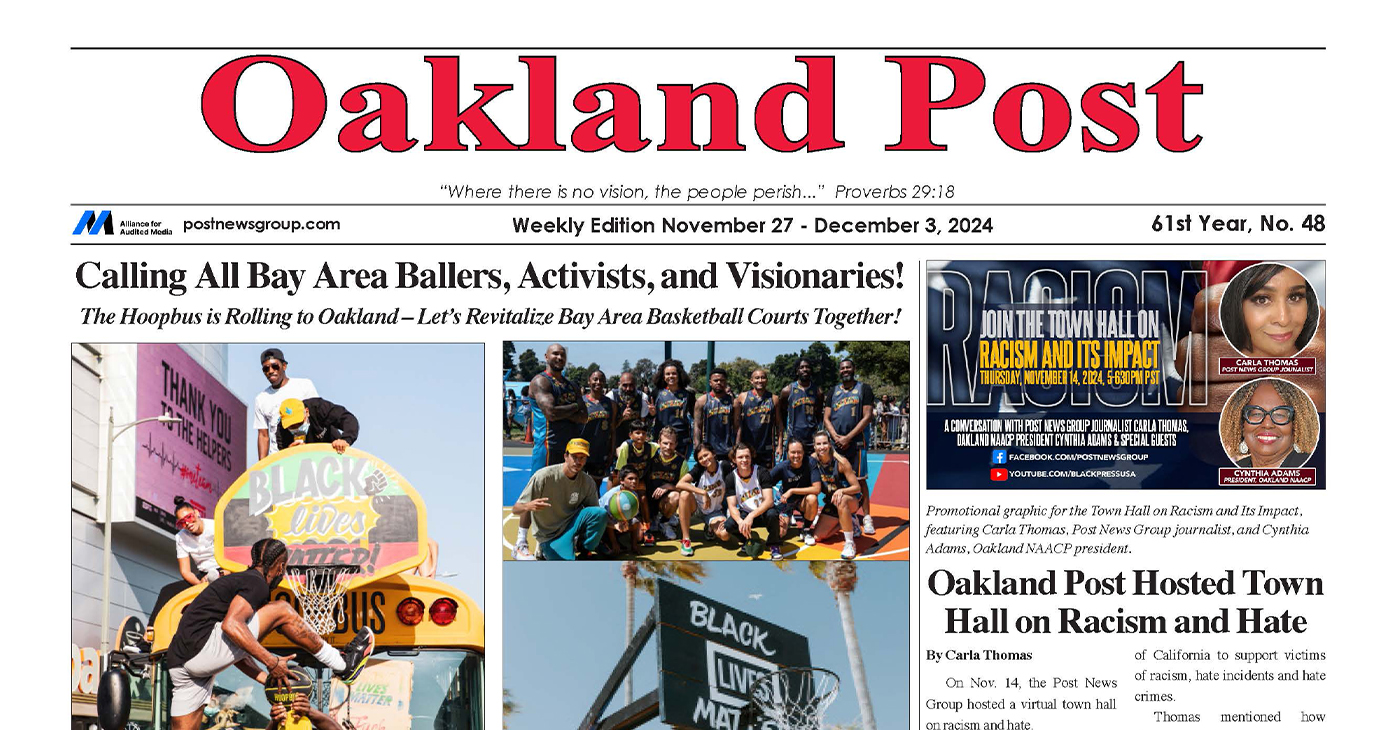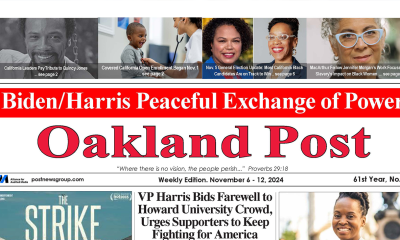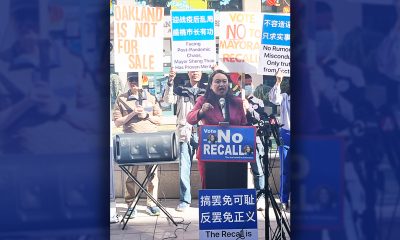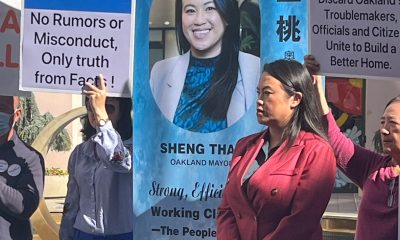Black History
PRESS ROOM: Va. Expands Funding to Restore African-American Cemeteries
THE AFRO — It doesn’t take more than a brief visit to East End Cemetery to see that racial inequality impacts not only the living; it extends to the dead as well.
It doesn’t take more than a brief visit to East End Cemetery to see that racial inequality impacts not only the living; it extends to the dead as well.
Many of the graves in this Henrico County cemetery, the final resting place for hundreds of African-Americans who lived during the 19th century, are overgrown with weeds, their spots unmarked, sunken and fading away.
East End is one of many historic African-American cemeteries neglected for decades around the nation. But this week, the General Assembly made 19 more of these cemeteries eligible for state maintenance funds.
One of the graveyards — the Tucker Family Cemetery in Hampton — may hold the remains of William Tucker, believed to be the first child born to Africans brought to America in the 1600s.
“In order to preserve these gravesites, especially on the 400th anniversary of the first Africans being brought to our shores and sold into slavery, the city of Hampton would like to add these cemeteries,” Sen. Mamie Locke, D-Hampton, said in introducing SB 1128.
The bill and its House companion, HB 2681, introduced by Del. Delores McQuinn, D-Richmond, will add seven Hampton cemeteries to the list of burial grounds eligible to receive funds from the Department of Historic Resources.
Other bills that have passed both the House and the Senate would provide funds to six African-American cemeteries in Alexandria, three in Martinsville, one in Suffolk and two in Pulaski County.
The bills expand on previously enacted legislation to allocate funds to refurbish and maintain graves of African-Americans who lived during the 1800s.
McQuinn started the efforts in 2017 by securing funding for East End Cemetery and nearby Evergreen Cemetery. Last year, the General Assembly added African-American cemeteries in Charlottesville, Loudoun County and Portsmouth.
This story was produced by the Virginia Commonwealth University’s Capital News Service.
This article originally appeared in The Afro.
Activism
Oakland Post: Week of November 27 – December 3, 2024
The printed Weekly Edition of the Oakland Post: Week of November 27 – December 3, 2024, 2024

To enlarge your view of this issue, use the slider, magnifying glass icon or full page icon in the lower right corner of the browser window. ![]()
Black History
Emeline King: A Trailblazer in the Automotive Industry
Emeline King is recognized as the first African American female transportation designer at the Ford Motor Company. Let’s take a look at her life and career at the Ford Motor Company.

By Tamara Shiloh
Emeline King is recognized as the first African American female transportation designer at the Ford Motor Company.
Let’s take a look at her life and career at the Ford Motor Company.
King’s fascination with cars began during her childhood. Growing up, she was captivated by the sleek designs and mechanical complexities of automobiles. She loved playing with toy cars and considered it an insult if anyone gave her a doll.
King pursued her interest in cars by studying at the ArtCenter College of Design in Pasadena. There, she improved her skills in transportation design, gaining the technical expertise and artistic vision she needed to break into the male-dominated industry.
However, her true inspiration came from her father, Earnest O. King, Sr., who worked for Ford as a Fabrication Specialist. She remembered the father-daughter trips to the auto shows, and the Saturday mornings with the famous Black sculptor, Oscar Graves, who her father assisted in some of his commissioned art works.
She said Graves would mentor her in clay relief sculptures. She was always fascinated by the smell of clay that was a constant in his studio.
However, it was her first visit to her father’s job that became the catalyst for King to want a career in transportation design. At the company’s annual employee Christmas parties, she got the chance to meet his co-workers and learned about the roles they played in the auto industry. It was a chance to see some great cars, too.
Her career at Ford began in the 1980s, when women — particularly women of color –were scarcely represented in the automotive industry. King’s role at Ford was groundbreaking, as she became the first African American woman to work as a transportation designer at the company.
At Ford Design, she worked on the Ford Mustang SN-95’s interior. She also made several design contributions on other vehicles, too, including the interior components of the 1989 Thunderbird, the 1989 Corporate Steering Wheel, the 1989 Thunderbird Wheel/Wheel cover design program, the 1990 Thunderbird Super Coupe, the 1993 Mach III, the 1994 Mustang, to name a few.
King also served three foreign assignments: Turin Italy; Koln, Germany; and Brentwood, Essex, England — designing Ford cars for Europe.
Leaving Ford after about 25 years of service and along with her many speaking engagements, she wrote an autobiography about being Ford’s first female African American transportation designer titled, “What Do You Mean A Black Girl Can’t Design Cars? She Did It!”
She’s quoted as saying, “I’m now so proud to have written a book that I hope will inspire young girls and boys to never give up. To influence them so that they can stay focused and alert, and so they never look back. There are mentors who are placed in our lives to serve as our ‘Bridges to Destinations’ and allow us to cross over them to reach our dreams. Hoping they gain inspiration from my book, my motto for them is simple: ‘OPPORTUNITY IS NOW, SO GRAB IT! IF I DID IT, SO CAN YOU!”
Activism
Oakland Post: Week of November 20 – 26, 2024
The printed Weekly Edition of the Oakland Post: Week of November 20 – 26, 2024

To enlarge your view of this issue, use the slider, magnifying glass icon or full page icon in the lower right corner of the browser window. ![]()
-

 Activism3 weeks ago
Activism3 weeks agoLIVE! — TOWN HALL ON RACISM AND ITS IMPACT — THURS. 11.14.24 5PM PST
-

 Activism4 weeks ago
Activism4 weeks agoOakland Post: Week of November 6 – 12, 2024
-

 #NNPA BlackPress4 weeks ago
#NNPA BlackPress4 weeks agoOP-ED: The Illusion of Allyship. White Women, Your Yard Signs Mean Nothing to Me
-

 Activism2 weeks ago
Activism2 weeks agoAn Inside Look into How San Francisco Analyzes Homeless Encampments
-

 #NNPA BlackPress2 weeks ago
#NNPA BlackPress2 weeks agoPRESS ROOM: Clyburn, Pressley, Scanlon, Colleagues Urge Biden to Use Clemency Power to Address Mass Incarceration Before Leaving Office
-

 #NNPA BlackPress2 weeks ago
#NNPA BlackPress2 weeks agoFive HBCUs Leading the Charge in Creating Black Excellence
-

 Activism3 weeks ago
Activism3 weeks agoOakland Post: Week of November 13 – 19, 2024
-

 Activism2 weeks ago
Activism2 weeks agoOakland Post: Week of November 20 – 26, 2024



























































